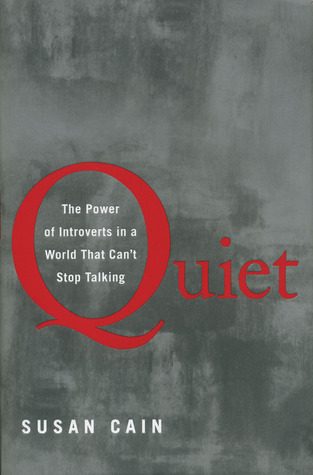This is one of the first books I can remember where the subtitle spoke to me more than the cover and title. This topic is near and dear to me because, as an introvert, I've had to readjust and think about so many things in my life this relates to, not to mention conversations within my marriage to my wonderful extroverted husband, and trying to understand and parent my children for their success.
I first heard of the term introvert, I think, when I was in high school. I had a pleasant enough experience with private elementary and then private high school in our town, and I did well. One of the things I didn't like through high school, was the group work. I dreaded this, for a few reasons. For one, I want whatever project I work on, to be well done. I do not like to leave my 'name on it' without my own expectations fulfilled; a job satisfied. I also found the group setting to be a significant waste of my time. I could be getting right down to work with my great idea, but instead I have to waste two to three class periods just listening to others bicker about what idea to even start with.
The distaste for group work is a classic introvert tale tell sign for children. In my own experience, I would generally gather the group by the reigns and become the leader because nothing was getting done in a timely manner, and it would frustrate the day- lights out of me. When under pressure, and no system in place, I become a manager willing to delegate tasks to others who I find directionless for the sake of efficiency. I am an introvert, who, over the years, has learned to be a really good fake extrovert.
Wow. That sounds horrible when fleshed out. But it's true.
***
When I was given a large project to work on in school, I never procrastinated, because I do not work well under pressure (unlike my classmates in college who would have 3 weeks to write a 10 page paper, and wouldn't begin until 48 hours before it was due...I would have had it done for a week) and I like to take my time.
***
As an adult, I took a test where the outcome is very telling as far as personality traits: the Meyers Briggs. Unfortunately I don't remember much of the outcome other than the fact that I was an over-the-top "I" for introvert. I've always preferred my pajamas, a good book or movie, and being home the majority of the time, than going out. Even now, I am always reeling conversations through my mind and trying to re access what I should have said; how my comment (that went unsaid) could have perhaps benefited the group or added to the conversation. In the heat of the moment, though, my mind goes blank and I have a really hard time articulating myself fast enough (or, what I think should be fast enough) and it gets garbled. It got worse, somehow, after I had children.
***
In Quiet, Susan Cain puts all her compiled research and presentations she's given about introverts and tapped into a very informative non-fiction book that I read in about a week. Mrs. Cain's book first started out as a TEDTalk, which I haven't seen yet. I love the format and the TEDTalks I've seen, so I assumed the book would be good.
The book is really a lot of research compiled into about 260ish pages, that fleshes out every general area introverts look differently from the American Culture Norm. Our society is an extroverted driven place, where gregariousness is often relished, and the quiet thinkers are unpopular. Cain's book is a look at how many, Many, Many introverts are the ones who change the course of the world based on their thoughts and the way they direct their fields.
The way the book is written is very interesting. Often, a story about a real couple or a real person is given, and it's left with the 'what happens next?' hanger. Then, Mrs. Cain brings in her research (and there is TONS of research about personality differences, introverts, and extroverts out there), and ties it all together. She gives many ways to support the introvert, the extrovert, and why, specifically, introverts act the way they do in common situations (see above). The research indicates that one-third to one-half the population are introverts, but often no one would guess because introverts are very good at become fake-extroverts, but extroverts don't need to play this role-reversal.
I give this book 4 out of 5 stars because it was well written and an interesting topic. I can't imagine recommending it to everyone, as it's a fairly academic book and it might be hard for some people to read in a timely manner without loosing interest. Who do I think should read this? Spouses, parents, and managers of companies who find themselves in near proximity to introverts. They would all benefit from the research indicating how introverted spouses often respond (in conflict and other life situations), how introverted children are best parented for success, and managers specifically-to tap into all the good the introverts -who may never speak up in a group meeting- can bring and benefit the common goal of the business in really unique ways.

Comments